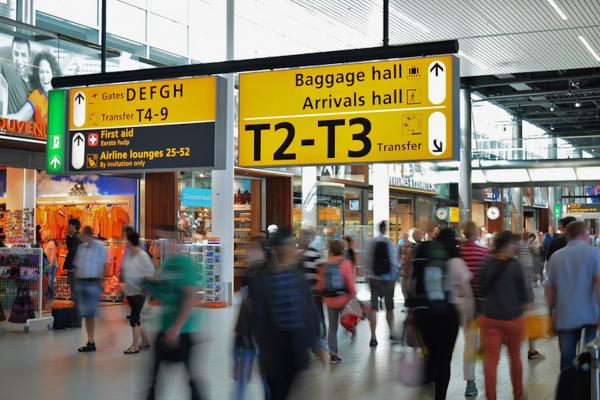It may seem like studying abroad is all about visiting new places, making new friends and generally just having a good time—which, in large part, is true. But it doesn’t mean that transitioning to life in a new country is effortless, and there are likely to be bumps along the way.
Here are five of the main challenges that I have faced since moving to Amsterdam, and my advice for overcoming them:
1. The language barrier
I am lucky that most Dutch people speak English—and I will be honest that knowing this was a large factor when choosing my study abroad destination. Being able to communicate in my native tongue was invaluable for sorting things out when I first arrived in the city and in my day-to-day life.
However, the language barrier does sometimes prove difficult, even with simple things like paying my rent or booking a haircut. Activities like this—which would normally only take a minute or two—now become serious accomplishments that can only be obtained with a large amount of patience and the aid of Google translate.
I will also sometimes find myself in a conversation with a person in the street (particularly elderly Dutch ladies, it seems), who will enthusiastically begin to talk to me in Dutch while I stand awkwardly and wonder when to interrupt and let them know that, unfortunately, I can’t understand what they're saying.
Learning the language is definitely something I want to start focusing on. The university runs language courses, but these are quite expensive. So instead, I have been using the language learning app Duolingo. It teaches you a foreign language through a series of “levels,” which you earn points after completing. I would recommend this to anyone who is looking for a more casual way to learn a language.
2. FOMO
Possibly the most 21st century emotion there is, FOMO (or "Fear Of Missing Out," in case you weren’t aware) is something that I realized I would have to face up to at some point during my study abroad experience.
For me, it hit about four weeks into my time in Amsterdam, when my friends back home went back to start their final year of university—and I realized that I was not going to be a part of it. Cue several days of stressing about all the things I was going to be missing out on, and seriously questioning why I’d chosen to move abroad when my entire life was back in the UK. However, this feeling eventually subsided, particularly after I went home for a weekend in mid-October and realized that in reality, nothing had really changed.
Of course, there will be occasional events that I will be missing out on, but I have also had so many diverse experiences since being in the Netherlands that would have never have happened had I stayed at home this year. I definitely think I’m getting the better end of the deal.
For anyone who is considering study abroad but worrying about missing out on things going on back home, don't let FOMO hold you back. You will probably not be missing as much as you think.
3. Academic life
The structure at the University of Amsterdam is very different to what I’m used to, which threw me a little when I started my course. Each term is divided into two eight-week “blocks,” in which you take two or three courses, with exams at the end of each block. Having so few classes might seem as though it would be easy, but the course organization is much more intense than I’m used to, with assignments for each course needing to be submitted once or twice every week.
My first examination experience in Amsterdam was also very different from the UK—to a point that was unnerving. Examinations at home have always taken place in a freezing sports hall patrolled by invigilators who appear to have been hand-picked for their intensely unfriendly personalities, and who will forcibly remove you from the hall unless your water bottle has been stripped of its label. At UVA, you do your exam in the lecture hall. You can have your bag beside you, can talk to your friends, are allowed to eat and probably even use your mobile phone without anybody batting an eyelid. It was weird.
Adjusting to new ways of learning can be hard, and you realize how much you are probably used to a particular pattern of studying. However, I think this will be beneficial for me in my final year back at my home university, as it has made me aware of different studying styles, and will hopefully make me a better learner.
4. Endless opportunities
In Amsterdam, there is always something going on. And because there’s always something going on, it seems to be a waste to not be out 24/7 doing something new and exciting. Unfortunately, this mentality doesn’t lead to a strong work ethic, and it has often been a struggle to remind myself that I am technically here to study.
On top of the temptations of Amsterdam itself are the endless opportunities to travel. Being surrounded by so many people from far-flung corners of the world, many of whom have never previously been to Europe, there are constantly new suggestions of places to go for a weekend.
In large part, this is amazing, as I am getting to visit places that I have always wanted to go and places that I had never thought of going before. Spending a week in my flatmate’s home village in Slovakia (a country I had never even considered visiting before) surrounded by picturesque mountains has been one of the highlights of my trip so far. However, one of the lowlights was returning from this trip to Amsterdam with only 24 hours to revise for my first midterm exam.
The issue lies in knowing where to draw the line. It's easy to get carried away and forget that you are living on a student budget. Plus, being away from your exchange city too many weekends in a row can really slow down the process of settling in. My advice would be to make the most of the opportunities available to you—but don't forget to spend time in your exchange city, so that it will start to feel more like home.
5. Self-care
With all of these things to take into account, it’s sometimes hard to make time to relax and look after yourself. However, this is probably the easiest challenge to overcome. Just make sure to take some time off every now and then to spend some quality time with Netflix and engage in some “me-time.”
And if constantly challenging yourself gets tough at any point, remember to be proud of how far you have come.
Add this article to your reading list




